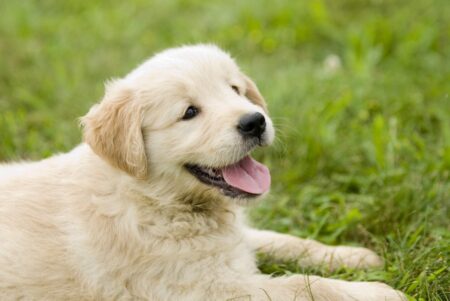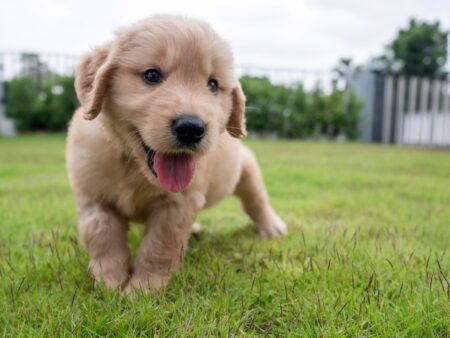
Is Your Puppy Breathing Fast? We Have The Answer
Bringing a new puppy into your home is an exciting and joyous experience filled with playful moments and the beginning of a lifelong bond but, this new responsibility can also bring with it a host of other concerns about your puppy’s health and well-being like your puppy breathing rapidly.
Rapid breathing in puppies can be a source of worry for pet owners, as it might indicate an underlying health issue. We will discuss what normal breathing patterns in puppies should be, the potential causes of rapid breathing, and when it might be necessary to seek veterinary care. By understanding these things, you can ensure your puppy receives the best care possible thereby promoting their health and happiness as they grow.
Is Your Puppy Breathing Fast? We Have The Answer
To know if your puppy is fast or not, here is what you need to do,
For most puppies, the normal resting respiratory rate is between 15 to 40 breaths per minute. Although, this can vary slightly based on the breed, size, and age of the puppy.
So, to accurately measure or know the rate of your puppy’s breath, count the number of breaths they take in one minute while they are resting or sleeping. Each rise and fall of the chest counts as one breath.
SEE ALSO: Why Does My Cat Bite My Nose?
What is the Normal Breathing Rate for A Puppy?
Puppies typically have a faster breathing rate compared to adult dogs due to their higher metabolism and energy levels. However, the normal breathing rate is 15-40 breaths per minute, a little higher than an adult dog’s 10-30.
Here is how to accurately measure it: observe when they are calm and resting. Count the number of breaths (one rise and fall of the chest equals one breath) they take in one minute. This can be done by setting a timer and counting the breaths for a full 60 seconds to ensure accuracy.
What Does My Puppy’s Breathing Sound Like?
The sound of your puppy’s breathing can provide important clues about their respiratory health. Normal breathing should be quiet and effortless, but various conditions can cause changes in the sound of their breath. Here are different normal breathing sounds for puppies and what they be:
- Quiet and Steady: A healthy puppy’s breathing is typically quiet and steady, without any unusual noises.
- Soft Inhalation and Exhalation: The sound of air moving in and out should be soft and barely noticeable.
- Silent During Sleep: During sleep, especially deep sleep, a puppy’s breathing is often silent and even.
Puppy Breathing Fast and Shallow
Breathing fast and shallow can be concerning for puppy owners although fast and shallow breathing in puppies can also be a normal response to exercise, excitement, or heat, but it can also indicate serious health issues. Understanding the potential causes and knowing when to seek veterinary care is essential to ensure your puppy’s health and well-being.
Normal vs. Abnormal Breathing Patterns
- Normal Fast Breathing: Puppies may breathe rapidly after exercise, during play, or in response to excitement or heat. This type of rapid breathing should slow down once the puppy calms down or rests.
- Shallow Breathing: Shallow breathing involves taking small, quick breaths that do not fully inflate the lungs. This can sometimes be normal in certain situations, but it often indicates an underlying issue when persistent.
4-Month-Old Puppy Breathing Fast While Sleeping
Fast breathing while sleeping in a 4-month-old puppy is often normal, especially during REM sleep. However, if it persists or is accompanied by other symptoms like labored breathing and behavioral changes then, it may indicate an underlying health issue. Monitoring your puppy closely and consulting with a veterinarian when in doubt will help ensure your puppy remains healthy and happy.
8-Week-Old Puppy Breathing Fast While Sleeping
Fast breathing while sleeping in an 8-week-old puppy is often a normal part of their development, particularly during REM sleep. However, if the rapid breathing is persistent or accompanied by other symptoms like labored breathing, coughing, wheezing, nasal discharge, lethargy, or a blue tinge to the gums thentransparent;”>, it may indicate an underlying health issue. Monitoring your puppy closely and consulting with a veterinarian when necessary can help ensure your puppy remains healthy and happy.
12-Week Old Puppy Breathing Fast While Sleeping
Fast breathing while sleeping in a 12-week-old puppy is often a normal part of their development, especially during REM sleep. However, if the rapid breathing is persistent or accompanied by other symptoms like labored breathing, discomfort, restlessness, or other behavioral changes then, it may indicate an underlying health issue. Monitoring your puppy closely and consulting with a veterinarian when necessary can help ensure your puppy remains healthy and happy.
Reasons Why Your Puppy May Be Breathing Fast
Fast breathing in puppies can happen for plenty of reasons ranging from normal physiological responses to underlying health issues. Understanding these reasons can help you determine when it’s normal and when it’s not.
1. Normal Physiological Responses
Exercise and Play:
- Description: After vigorous activity or play, puppies may breathe faster to meet the increased oxygen demands of their bodies and to cool down.
- Normalcy: This is typically normal and should resolve once the puppy rests.
Excitement or Stress:
- Description: Puppies can breathe rapidly when they are excited, anxious, or stressed, such as during play, meeting new people, or hearing loud noises.
- Normalcy: This fast breathing usually subsides once the puppy calms down.
Heat Regulation (Panting):
- Description: Puppies pant to regulate their body temperature, especially in hot weather or after exercise.
- Normalcy: Panting is a normal cooling mechanism but ensure the puppy has access to water and a cool environment to prevent overheating.
2. Sleep-Related Causes
REM Sleep:
- Description: During REM (Rapid Eye Movement) sleep, puppies may breathe faster, twitch, and make small vocalizations due to dreaming.
- Normalcy: This is a normal part of the sleep cycle and not typically a cause for concern.
3. Medical Conditions
Respiratory Infections:
- Description: Infections such as pneumonia, kennel cough, or bronchitis can cause rapid breathing due to inflammation and fluid in the lungs.
- Symptoms: Additional signs include coughing, nasal discharge, fever, and lethargy.
- Action: Seek veterinary care if these symptoms are present.
Heart Problems:
- Description: Congenital heart defects or other heart issues can lead to breathing difficulties as the heart struggles to pump oxygenated blood efficiently.
- Symptoms: Signs may include coughing, fatigue, bluish gums, and lethargy.
- Action: Immediate veterinary evaluation is needed if heart problems are suspected.
Pain or Injury:
- Description: Pain from an injury or internal issue can cause a puppy to breathe rapidly and shallowly as a response to discomfort.
- Symptoms: Look for signs such as whining, limping, reluctance to move, and visible injuries.
- Action: Veterinary care is necessary to diagnose and treat the cause of pain.
Anemia:
- Description: Low red blood cell count reduces the oxygen-carrying capacity of the blood, causing the puppy to breathe faster to compensate.
- Symptoms: Pale gums, weakness, lethargy, and decreased appetite.
- Action: Seek veterinary care for diagnosis and treatment.
Allergic Reactions:
- Description: Allergic reactions can cause swelling of the airways and rapid, shallow breathing.
- Symptoms: Hives, itching, swelling, and severe reactions leading to difficulty breathing.
- Action: Immediate veterinary attention is required for severe allergic reactions.
Parasites:
- Description: Heavy infestations of parasites, such as heartworms or lungworms, can lead to breathing difficulties.
- Symptoms: Coughing, lethargy, poor coat condition, and visible worms in feces.
- Action: Regular deworming and veterinary check-ups can help prevent and treat parasitic infections.
4. Environmental Factors
Heat and Humidity:
- Description: Hot and humid conditions can cause puppies to breathe faster as they try to cool down through panting.
- Normalcy: Ensure your puppy is in a cool, shaded environment and has access to water to prevent heatstroke.
Exposure to Irritants:
- Description: Smoke, dust, and strong chemicals can irritate a puppy’s respiratory system, leading to rapid breathing.
- Action: Remove the puppy from the source of the irritant and ensure good ventilation.
What to Do If Your Puppy is Breathing Fast
If you notice that your puppy is breathing fast, here are steps you can take:
- Stay Calm: Remain calm to avoid stressing your puppy further. Your calm demeanor can help reassure your puppy and prevent exacerbation of any underlying issues.
- Check the Environment: Ensure your puppy is in a safe, comfortable environment with adequate ventilation and a moderate temperature. Avoid exposing them to extreme heat or cold.
- Monitor Your Puppy: Observe your puppy closely to determine if the fast breathing is temporary or persistent. Note any accompanying symptoms or behaviors that could indicate distress.
- Assess for Signs of Distress: Check for signs of distress such as coughing, wheezing, nasal discharge, lethargy, bluish gums, or difficulty breathing. These could indicate a more serious problem requiring immediate attention.
- Check Activity Level: Consider what your puppy was doing before the fast breathing started. If they were playing vigorously or excitedly, the fast breathing may be normal and should subside as they calm down.
- Offer Water: Ensure your puppy has access to fresh water. Hydration is important, especially if the fast breathing is due to heat or exertion.
- Monitor Breathing: Pay attention to the pattern of breathing. If your puppy’s breathing is labored, shallow, or irregular, it could indicate a medical emergency.
- Contact Your Veterinarian: If you’re concerned about your puppy’s fast breathing or if it persists despite calming down, contact your veterinarian for guidance. Describe the symptoms and follow any advice given.
- Follow Veterinarian’s Advice: Follow any instructions provided by your veterinarian, which may include monitoring your puppy closely at home, scheduling a veterinary examination, or seeking emergency care if necessary.
- Be Prepared for Emergencies: Have important phone numbers, including your veterinarian’s contact information and the nearest emergency veterinary clinic, readily available in case of emergencies.
SEE ALSO: Ways to Help Your Cat Limping Back Leg to Health
FAQs
Q. Is it normal for a puppy to be breathing fast?
Yes, puppies just like human babies tend to breathe faster than adult dogs. This is often perfectly normal and can be attributed to their higher metabolic rate.
Q. Is it normal for puppies to pant fast?
While most times your puppy breathing fast is probably due to the reasons we’ve outlined above, such as temperature change or emotional reasons. However, labored breathing or heavy panting with an unknown cause can be a sign that your puppy is unwell.
Q. Why is my puppy breathing so fast while sleeping?
Here are some of the reasons why your puppy is breathing so fast while sleeping:
- Anemia
- Heart Disease
- Pain
- Respiratory tract infection
- Laryngeal paralysis
- Asthma
- Respiratory disease
- Exercise
- Heatstroke


